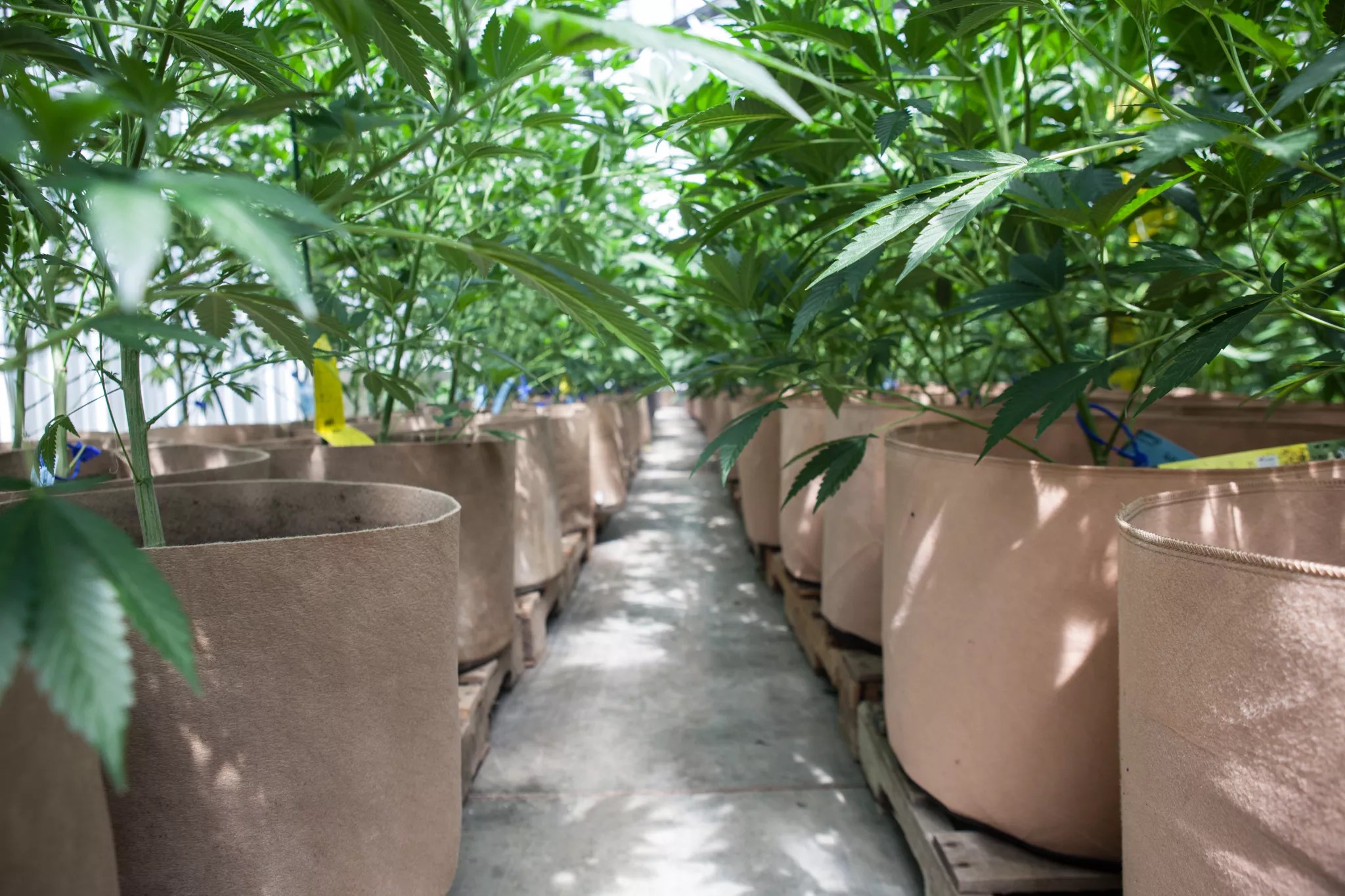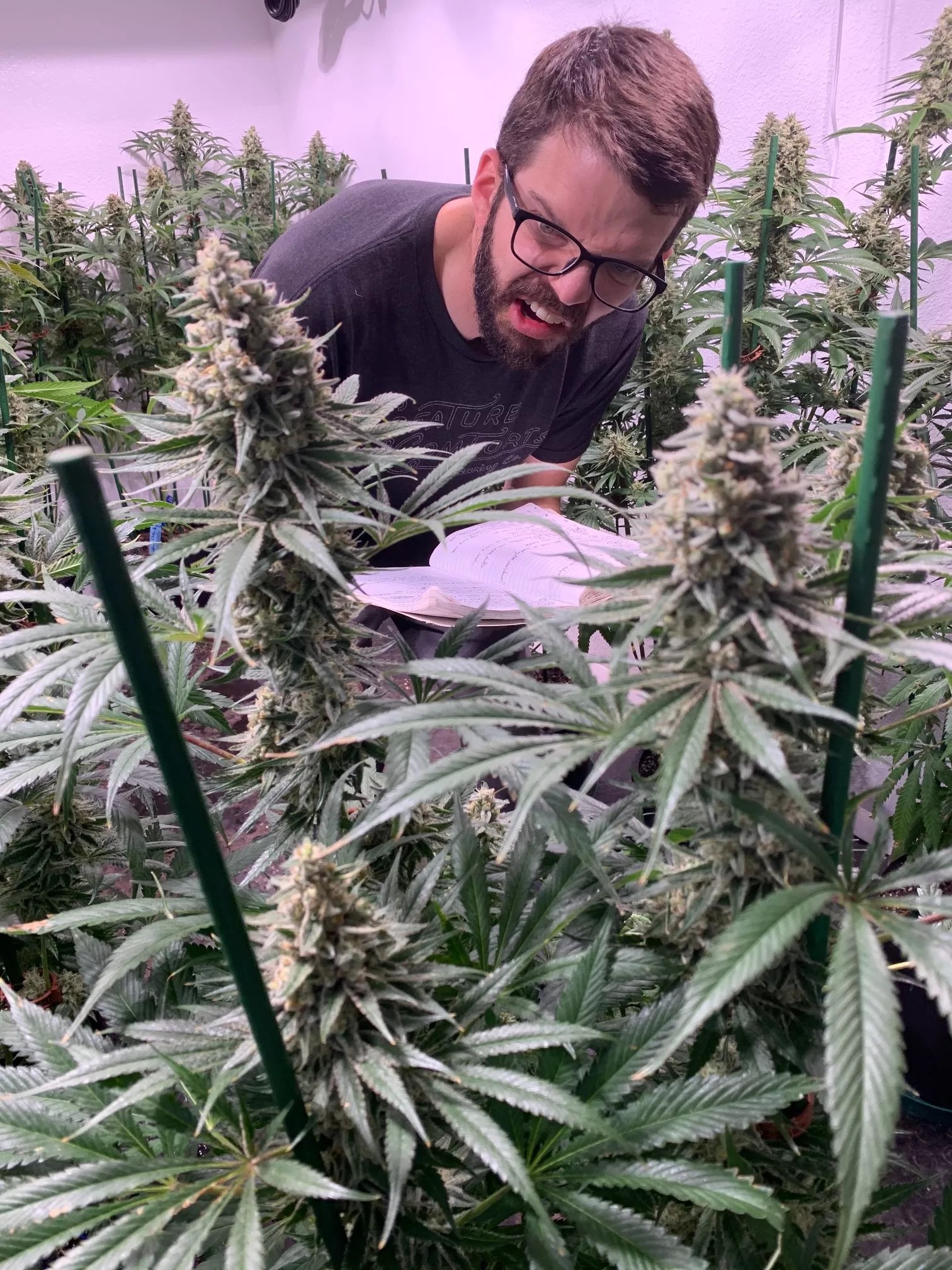
Jacqueline Collins

Audio By Carbonatix
Sam Epstein has created nearly 1,000 crosses of cannabis strains since he started breeding professionally over a decade ago, and about one-tenth of them have been deemed good enough for the marketplace. The co-founder of FreeWorld Genetics is picky with what he puts out there, but he isn’t as selective about whom he works with, selling clones and seeds to wholesale operations and home growers alike.
In an industry where intellectual property is still battled over and wholesale growing is still much more lucrative than breeding, FreeWorld’s approach is rare. But according to Epstein, that’s the whole motto of FreeWorld: Spread the knowledge, and everyone wins. We caught up with the longtime green thumb to siphon off some of that knowledge and learn more about the future of cannabis breeding.
Westword: Starting a cannabis seed and breeding company as opposed to a commercial grow is pretty rare in Colorado. Why go that route?
Sam Epstein: We have a licensed grow, but we use it only for breeding purposes. It’s really an affliction, if I’m being honest. I’m so obsessed with seeing and making new stuff, and a lot of it is about helping people by giving them better genetics. A lot of these big, beautiful growing facilities might have the same twenty strains they’ve been trying to kick down the curb for the last decade, and people don’t realize that you can only achieve a certain excellence based on the genetics you have.
We’ve been able to work with hundreds of grows over the years, and it’s been this unique eye into the industry, where we’ve been able to see it from different angles and under everyone’s bridges a little. I only say it like that because of how humbling and overwhelming it is to see how many struggles we all share. This industry grew up keeping secrets from each other, and for a long time all these techniques were secrets, but I think by now most people have realized it takes more than that to stay alive. We’ve found that being open and sharing is more effective [than] holding stuff back and trying to create this elite vibe of exclusivity.
Are you able to check in on cultivations that use your genetics, in order to make sure your strains are being represented correctly at the dispensary?
We’d like to, but no. The reason few people do what we do is because it’s set up to fail in a lot of ways. If you go by the standards of every dude on the internet, then all breeders are dog shit. You’re supposed to take every line out for five generations, go through every stabilization, and nothing is allowed to herm – but who’s actually paying to get us there? Since the world doesn’t really pay us to get us to the standards they hold us to, we kind of shake it until we make it. Can I demand everyone grows my strains to perfect excellence so the marketplace only sees shining examples? Absolutely not.
I can’t only work with people who I deem excellent growers. I have to work with everyone I deem nice and good to work with, and we really are all about raising people up. Everyone has a bad grow sometimes, so we try to have genetics that are really hard to screw up. When a strain is grown in 100,000-square-foot facilities and it’s crash-dried, machine-trimmed and machine-packaged, then you really need a star to come out the other side and still have some terps. For us to breed the strongest, the stinkiest and the extremes of every category, they still need to shine in a commercial marketplace where some of that gets dumbed down a bit. That’s the ultimate challenge. When you give it to a heady home grower, they’ll make everything look good, but what about crop rows in the desert 100 miles east of Pueblo?

FreeWorld Genetics co-founder Sam Epstein
Courtesy of Sam Epstein
What goes into launching a genetics line? Do you start with a few mothers or breeding combinations you feel safe with and then build on top of it? Or is it more experimental at the beginning?
I used to do a lot of beer brewing, as well, and a big part of it is just getting lucky early on. We threw some stuff at the beginning out of desperation and being sick of what we kept getting from Amsterdam. We had to get lucky with those first few crosses, which lit the fire and put us on a path that is essentially arduous and full of failures – but by getting lucky in the beginning, we knew it was possible to make something cool. From there, it took us about ten years to learn what good breeding is, and now we have more of an eye for it.
Most of the breeding now is purpose-driven, though, and bred for outdoor markets, Colorado-type indoor marketplaces, and so on. We breed for indoor and high-THC stuff, which I’m sort of ashamed that our market demands. Some people need or want that, so that’s what we’ve had to put together. We don’t get to breed entirely what we want, because we have to breed what the market is asking for, too. We don’t get to stay here if we don’t serve that. My breeding was a result of my work in commercial cannabis growing, and a lot of that came from seeing my favorite strains kicked out of the garden because they didn’t “perform” well enough. The old legacy strains people ask about – they just couldn’t keep up in the garden. So our jobs as breeders is to snag those strains and try to find compatibilities with other strains to bring those lines and attributes forward into the next generation.
The brewing connection is interesting, because you’ll see breweries blow up off one popular sour or IPA, then build success from variations of it. So many family trees in the cannabis world start with a base, too, like a Chemdog or Girl Scout Cookies, and blow up from there.
Cannabis is at the point where there’s, like, forty flavors. The idea that there are all these takes on lemon, but it can all go back to a Lemon G or something like that, and we’re constantly shaking and tweaking it to build more. It’s crazy, sometimes, the way it’s built up in different ways. For example, we just “made” Gorilla Glue with genetics that are nothing like the original Gorilla Glue’s. Sometimes you can cross these genetics that have nothing to do with another strain, yet still create those exact terps.
We’re always working on our version of a Chem, and most breeding companies have their takes on something sour. I’m really over people acting like cannabis is only theirs, though. I’d prefer to see breeders want their lines to be improved, and not act as if it’s only their thing. Our Free MAC is one of our more popular strains, and that’s only because MAC – some of my favorite herb, but it’s extremely low-yielding and doesn’t really produce strains – was passed around for free by the breeder, Capulator. The rule fo the MAC was that you couldn’t sell it, you could only give it to people who deserve it. It was brilliant, because he told everyone to breed it all you want, but it won’t make seeds, and that was such a challenge – because it doesn’t make fucking seeds! We had to breed it three times to get one single seed, which eventually became Free MAC. It doesn’t make seeds, either, but it tests at 30 percent THC and yields buckets. We take these things in cannabis, like Chem or OG qualities, and we try to explore it every different way.
How many of your breeding experiments don’t make the final cut?
Since we started FreeWorld in 2018, we’re about to crack the 400th cross this year. Overall, my partner and I have cracked around 1,000 crosses, and we’ve maybe released around one hundred. The [phenotype] hunts are getting more challenging now, because so many of them are incredible now, as opposed to the past, when there’d only be one or two that stood out. Lately, I’ve been into releasing more phenos of the same strain, both in clone varieties and in our seed line. In the commercial realm, it’s beneficial for me if I can get a grow to take a few phenos of the same cross and do a test grow. More often than not, they get the best results from a pheno that another grow didn’t. It’s shocking how different they can look from grow to grow, even if the facilities are running similar systems.
For us, it’s all an issue of space. We re-examine every strain quarterly to keep the genetics fresh. And since we just lost our smaller grow, we’ve had to move in a lot of things and pull out some strains to make room.
It seems like some of the Cookies, Cakes and Pie hysteria has died down a bit. What other trends have you noticed in cannabis breeding?
That was exhausting, and I do feel like cannabis was dumbed down because of it. The strains are very similar on the palate, and we cul-de-saced hard there – but if people are into something, that’s just going to be the way it is. I’ve heard whispers of a low-THC revolution coming. When we first started the company, I was passionate about the one-to-ones and full-spectrum strains, but ultimately felt the market wasn’t ready.
The CBD strain is like your old legacy strain, and they just don’t yield and look as good. They’re more primitive, so we wanted to work on making really gorgeous CBD strains. But even with that, if it comes in at 7 percent THC, the wholesale still wants to pay half the normal price for it. We wanted to go into that path, but sort of got wrestled out of it by the customer. We backed off on that, but still have pieces in place for when it comes back. I think session cannabis will become more of a thing. I like seeing pre-rolls taking off more, too, which I never called. The potency numbers and visuals aren’t as important as the taste and experience.
How much do home growers and underground breeding influence the commercial sector nowadays?
I’m trying to carry the soul of the breeders and home growers into business meetings. It does influence us, for sure. All of these companies want to be part of that culture but don’t know how. We try to bring strains that have vibes and mojo, and I probably hear more feedback from home growers on Instagram than commercial operations. Home growers are way more vocal. I’m often recommending strains to a bigger grow based on Instagram feedback.
I’m really about open-sourcing. If you buy our seed pack, then breed with it! That’s how we got here. Yet at the same time, I don’t want a bigger company just taking a clone of my stuff and running off with it. I want the little guy to be able to take it and work, but I want the big guys to have heavy limitations on my [intellectual property], because they’re the ones who can take it way too far [laughs].